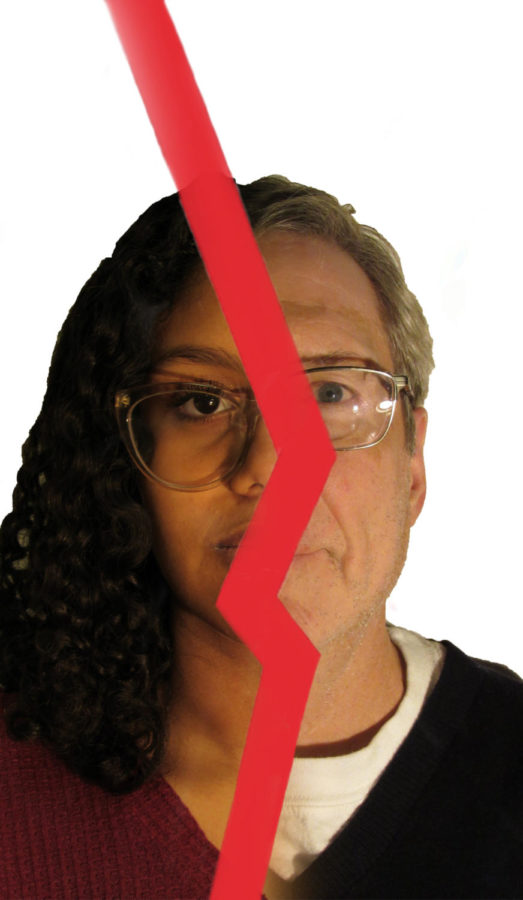“OK, Boomer”: Students clap back at older generation
A millenial stands on the left with a boomer on the right side and a crack splits the photo down the middle, dividing them
It began as meme reacting to the older generation’s complaints about Millennials and Generation Z being too “sensitive” and “weak”. It’s a quick, sarcastic quip to an age-old insult, and Boomers are not happy.
But there is no real justification for the older generation’s outrage — not just towards the birth of “OK, Boomer,” but also toward younger generations in general. There is no reason to believe that the newer generations are any worse than the ones before them.
It may seem like younger generations are more problematic than ever before, but the tearing apart of up-and-coming adults has been a habit of their predecessors for centuries. Look at this news article from a 1951 copy of Falkirk Herald:
“Many [young people] were so pampered nowadays that they had forgotten that there was such a thing as walking, and they made automatically for the buses… unless they did something, the future for walking was very poor indeed.”
Spanning back to times as early as 4th century BC, according to BBC, the older folks always found something to complain about regarding the newer generation. They are too soft, too selfish, too stubborn, too pampered to get around with their own two legs. Sound familiar? It’s the same exact ideas that are mentioned today.
Another jab is that Millennials and Gen Z are over-sensitive “snowflakes” that simply can’t handle the tumultuous ups-and-downs of life. They demand safe spaces, mental health day and need everyone to listen to their opinions.
Millennial teacher, Mr. Reagan, believes that the difference in values and world perspectives is a major culprit in the disagreement between the age groups.
He explained, “Generations now value certain social, economic and political ideals that are a lot different than they were back then.”
These newer generations are more socially progressive than the ones before them. Thanks in part to social media, people are now more openly discussing issues about race, the LGBTQ+ community, and mental health than in the past. They are promoting tolerance for the diverse minds and bodies that populate our society.
Millennials and Gen Z are not too “soft,” but rather more empathetic and more in tune with their own emotional intelligence. Many are able to recognize when they need to listen to each other, or when they need to take a break and listen to their own bodies.
To label the younger generations as weak is downright insulting; research shows they are extremely hardworking, even to the point of experiencing stress-induced burnout. According to Harvard Business Review, 24% of Millennials opt to continue grinding through work rather than using available vacation days, compared to 9% of Gen Xers, and 17% of Boomers. They feel determined to show their complete dedication to the job and their invaluableness to the company, even if it means stretching themselves too thin.
The Millennial/Gen Z ambition isn’t only found in the workplace, either. Look at 16-year-old climate activist Greta Thunberg, for example. She has traveled the world, passionately speaking against climate change and debating revered political UN leaders who are four times her age. Thunberg is far from the stereotypical selfie-obsessed, chai-tea drinking caricature often painted of modern teenagers and young adults. She is not the only young activist speaking her mind, either. Malala Yousafzai, Desmond Napoles, and the Parkland shooting survivors are also prominent teen figures fighting for a cause.
Keeping this all in mind, it’s understandable why young people are getting fed up with the older generations for their tendency to berate Millennials and Gen Z for every little thing. It’s easy to regard their complaints with a flippant “OK, Boomer.”
Some students believe there is tension behind the Boomer memes. In a survey conducted by TSP, 77% of students agreed that there is tension between the older and younger generations.
Mr. Curry, an English teacher and Gen Xer, believes that some of this tension can be attributed to older generations wanting someone to blame for the problems of the world.
“It’s really easy to blame young people and scapegoat because you’re bad at defending yourselves,” Curry said. “You just don’t see the attacks coming, and old people are good at being bitter — they’ve been doing it their whole lives.”
It seems to be a knee-jerk reaction to fear change, or to fear lifestyles and views different from our own. For all we know, in thirty years, the Millennials and Gen Z’s will be shaking their fists at young adults, griping about “kids nowadays and their hoverboards.” They’ll be doing the same exact thing they swore they would never do.
The kids’ response? An eye roll and an “OK, Millennial.”

